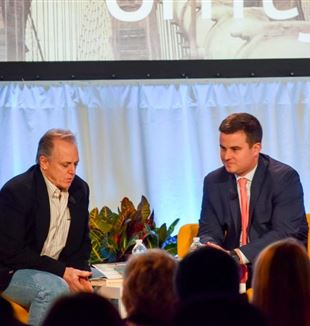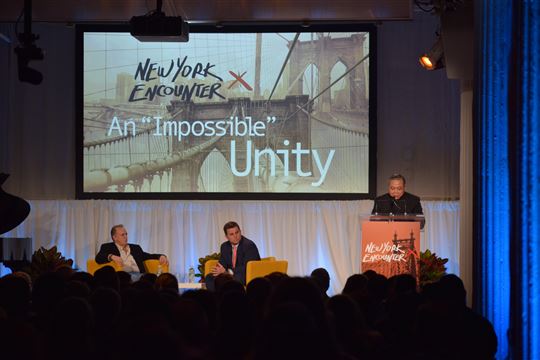
The Gift of an "Impossible" Unity
"Never let anger destroy your heart." Retired FDNY fireman John Bartlett and Sergeant Conor McDonald, NYPD, opened the 2018 New York Encounter with conversation.At 6:25 p.m. on Friday, January 13, 2018, a booming voice echoed through the halls of the Metropolitan Pavilion in New York City. The announcer invited visitors of the 2018 edition of the New York Encounter to the opening event, a conversation between retired FDNY fireman John Bartlett, and Sergeant Conor McDonald, an employee for the NYPD and Patrol Service Bureau and son of the late NYPD Detective Steven McDonald. By twos and threes and entire G.S. groups, the new arrivals left off catching up and gathered together in the auditorium. Silence fell and the lonely creak of a tired swing echoed through the room as the opening video of the encounter played, posing a provoking question: What if that unity we so long for were actually possible?
When the introductory video faded, another took its place recounting the story of Steven McDonald, an NYPD officer who was shot and paralyzed while attempting to prevent an armed bike robbery in Central Park. The video presented background information on the incident and its consequences, including multiple clips of Steven McDonald himself. Indeed, the officer’s voice resounded through the auditorium as he recalled the event: his certainty that he would die and his incredible gratitude for his partner who, rather than chasing after the assailants, stayed with him cradling his bleeding body and crying. Steven McDonald spoke of his wife’s “childlike” faith which saved his life, his decision–read publically at his son’s baptism–to forgive his assailant and his commitment to spreading the message of hope, love and reconciliation. As the video concluded, it was evident that the story of Steven McDonald was a simple yet profound “evidence of an impossible unity.”
The lights on the stage rose, and Bartlett and Conor McDonald mounted the platform to take their seats. Their attitude was not subdued, but it was quiet, as though each was still possessed by the memory of the man whose voice listeners had just heard in the video. Bartlett began, offering a brief introduction of Sergeant McDonald and affirming his gratitude for their new friendship before welcoming the latter to speak.
Conor McDonald’s elbows rested on bent legs and he leaned forward, his hands pressed together. He was calm, collected and yet full of tension. After expressing his gratitude towards the Encounter, his family and the NYPD officers seated in the first row, the sergeant told the story which had been summarized in the video from the perspective of his own personal relationship with his father. He had not yet been born when his father was injured while attempting to “talk it out” with three teenage bike thieves, but he recalled the facts and trauma of the incident not only for his father but for his father’s partner, also seated in the audience. Conor McDonald explained the series of events which led the McDonald family to Bellevue hospital, and the incredible manifestation of friendship the New York police force exhibited by serving daily mass at the paralyzed man’s bedside. He spoke particularly of the inspiration which Father Mychal Judge, a priest who would later die serving as a fire department chaplain on 9/11, gave his father by teaching him the peace prayer of Saint Francis. The sergeant described this moment as a turning point in his father’s life – the occasion on which an injured man decided his life would not be defined by tragedy.
Speaking of his father’s forgiveness for his assailant, Conor McDonald observed, “A lot of people have asked me if he really meant it.” He paused and gazed out at the crowd as if searching for words. Then he described his father’s condition as a quadriplegic. He underlined that though his father’s condition had been characterized by a totalizing dependence upon others, he had nevertheless traveled around the world to spread his message of reconciliation. The tenor of the sergeant’s voice expressed absolute certainty as he stated “[My father] was 100 percent totally committed to his message of love and forgiveness.”
Suddenly, John Bartlett jumped back into the conversation and read the Christmas Eve homily of Cardinal O’Connor, recorded in Steven McDonald’s biography. The Cardinal noted that in a hospital room where so much suffering was concentrated, the insistent hope and faith displayed by the McDonalds against all odds was a true miracle. Putting down the book, Bartlett looked around the auditorium. “Our theme is an impossible unity,” he said. Then he gestured emphatically and shrugged, “That says it all.”
Nodding, Conor McDonald resumed, turning to his own relationship with his father and his father’s insistence on unity. “My father always used to say to me when we had arguments, ‘Conor, do not let anger destroy your heart, you must let love win.’ As a young man growing up in this age, it’s tough to sit down and say the rosary, especially when your dad wants to say it every five minutes … I tell people that I loved my dad and knew how important he was, but maybe I didn’t completely appreciate his presence. I think we have to always believe in the dignity of human beings. Even if it was a young boy from a completely different background.” Recalling his father’s memorial mass only a few days before the sergeant concluded, “I got extremely emotional seeing the packed church, and it gave me faith to understand how important his message was: to never let anger destroy your heart and to forgive one another.”#NewYorkEncounter